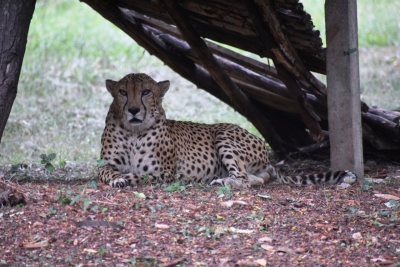By Praveen DwivediBhopal, April 30 : The deaths of two African cheetahs at Madhya Pradesh’s Kuno National Park (KNP) within one month has generated questions in government quarters and among wildlife enthusiasts on whether there were lapses in handling them at their new habitat where a total of 22 felines including four newly borne cubs are living.
Amid the questions, a team from the National Tiger Conservation Authority (NTCA) — the nodal agency for the “reintroduction of cheetahs” on Indian soil — will be visiting KNP soon to review the implementation of the project with the officials of the Madhya Pradesh forest department and the scientists of the Wild Life Institute of India, the NTCA officials told IANS.
In the meantime, the MP forest department pushed the recommendation for shifting some of the cheetahs to a new habitat, which is also part of the ‘Cheetah Action Plan’, as the officials claimed.Giving details of the ‘Cheetah Reintroduction Action Plan’, principal Chief Conservator of Forests (CCF) Wildlife of Madhya Pradesh J.S.Chouhan wrote to the NTCA in the first week of April (soon after female Namibian cheetah Sasha died) to find an alternative enclosure to shift some cheetahs from KNP.
“Keeping all the cheetahs at one site will be a risk for reintroduction of the cheetahs.Also, KNP can accommodate a maximum of 21 cheetahs at one time and at present it has 22 and therefore, I have requested the NTCA to find an alternative place to shift some of them,” J.S.Chouhan had told IANS a couple of days ago, adding that shifting of some cheetahs is also part of the “cheetah reintroduction action plan’.
There has been considerable debate among conservationists on whether the cheetah, which needs vast tracts of land to run and hunt, can thrive in India where suitable land is limited unlike in the African reserves.
Even before 20 cheetahs were imported from Namibia and South Africa, some experts had raised questions over how the space shortage is likely to affect the cheetah reintroduction project at Madhya Pradesh’s KNP, which has a core area of 748 sq km and a buffer zone of 487 sq km.
In such a situation, there are worries about the 11 South African cheetahs (one of the 12 South African cheetahs ‘Uday’ died a few days back) when they will be released into a larger area at KNP.As of now, the African cheetahs are in the acclimatisation enclosure.
The Cheetah Task Force Committee also pointed out this issue during it’s last meeting.”African cheetahs are in the acclimatisation enclosure and they will be ready for release in 15-20 days.Releasing all of them at KNP will not be practical, therefore an alternative site is highly desirable,” a member of the Cheetah Task Force Committee told IANS on condition of anonymity.
At the same time, sources aware of the developments claimed that shifting some of the cheetahs has raised a political controversy as there is a possibility that the alternative site will be the Mukundra Tiger Reserve located near Kota in Rajasthan.
Amid all this buzz, IANS sent some written queries to the NTCA.Responding on the shifting of the cheetahs, S.P.Yadav, a senior member of the NTCA said, “A cheetah action plan has been prepared in consultation with all experts in cheetah conservation.It is a long term project and should not be judged after a few months.Based on our experience at Kuno, further decisions on these issues will be taken.”
He added that “It’s sad that two cheetahs have died.However, in such transcontinental efforts the mortality of animals cannot be ruled out.Some of them may die due to several causative factors and it has already been factored into the Project Cheetah Action Plan available in the public domain.In compliance with the Hon’ble Supreme Court’s order cheetah translocation has been taken up on an “experimental basis”.
Replying to a further query if the NTCA has issued some directives to Kuno following the death of two cheetahs, the NTCA member said, “All the protocols of monitoring cheetahs are strictly being followed in the field.We are going to review the implementation of the project soon with MP government officials and scientists of the WII.”
Owing to rampant hunting, cheetahs were officially declared extinct in India in 1952.Seven decades later, on September 17, 2022, eight cheetahs were flown in from Namibia and released by Prime Minister Narendra Modi on his 72nd birthday at the KNP, marking the reintroduction of cheetahs into the Indian wilds.
Five months later, 12 South African cheetahs joined the eight Namibians at the KNP on February 18, taking the total number to 20.
However, the project suffered the first blow with the death of one of the Namibian females, Sasha on March 27 due to severe renal infection.Just two days later, another Namibian female gave birth to four cubs, the first cheetah births on Indian soil in seven decades.However, just 27 days later, one of the 12 South African cheetahs, an adult male Uday, died suddenly due to cardiopulmonary failure at KNP.The detailed report on what caused the cardiopulmonary failure is still awaited.
pd/bg
#Cheetah #Kuno #spur #initiate #project #review #Narendra Modi # Narendra Modi #Kota #Madhya Pradesh #Bhopal #Kota #Etah #Review #Narendra
.






